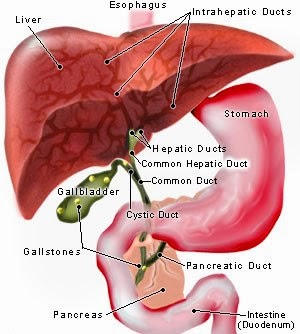Gallstones – Gall Bladder Stones
The gallbladder contracts and pushes the bile into a tube—called the common bile duct—that carries it to the small intestine, where it helps with digestion.
Bile contains water, cholesterol, fats, bile salts, proteins, and bilirubin—a waste product. Bile salts break up fat, and bilirubin gives bile and stool a yellowish-brown color. If the liquid bile contains too much cholesterol, bile salts, or bilirubin, it can harden into gallstones.
Types of gallstones
1-Cholesterol stones
2- Pigment stones.
Cholesterol stones are usually yellow-green and are made primarily of hardened cholesterol. Pigment stones are small, dark stones made of bilirubin.
Gallstones can be as small as a grain of sand or as large as a golf ball. The gallbladder can develop just one large stone, hundreds of tiny stones, or a combination of the two.
Gallstones can be as small as a grain of sand or as large as a golf ball. The gallbladder can develop just one large stone, hundreds of tiny stones, or a combination of the two.
Gallstones can block the normal flow of bile if they move from the gallbladder and lodge in any of the ducts that carry bile from the liver to the small intestine.
If any of the bile ducts remain blocked for a significant period of time, severe damage or infection can occur in the gallbladder, liver, or pancreas. Left untreated, the condition can be fatal. Warning signs of a serious problem are fever, jaundice, and persistent pain.
Causes for gallstones
Scientists believe cholesterol stones form when bile contains too much cholesterol, too much bilirubin, or not enough
bile salts, or when the gallbladder does not empty completely or often enough.
The reason these imbalances occur is not known.
bile salts, or when the gallbladder does not empty completely or often enough.
The reason these imbalances occur is not known.
The cause of pigment stones is not fully understood. The stones tend to develop in people who have liver cirrhosis, Biliary tract infections, or hereditary blood disorders—such as sickle cell anaemia—in which the liver makes too much bilirubin.
The mere presence of gallstones may cause more gallstones to develop. Other factors that contribute to the formation of gallstones, particularly cholesterol stones, include
- Sex. Women are twice as likely as men to develop gallstones. Excess oestrogen from pregnancy, hormone replacement therapy, and birth control pills appears to increase cholesterol levels in bile and decrease gallbladder movement, which can lead to gallstones.
- Family history. Gallstones often run in families, pointing to a possible genetic link.
- Weight. A large clinical study showed that being even moderately overweight increases the risk for developing gallstones. The most likely reason is that the amount of bile salts in bile is reduced, resulting in more cholesterol. Increased cholesterol reduces gallbladder emptying. Obesity is a major risk factor for gallstones, especially in women.
- Diet. Diets high in fat and cholesterol and low in fiber increase the risk of gallstones due to increased cholesterol in the bile and reduced gallbladder emptying.
- Rapid weight loss. As the body metabolizes fat during prolonged fasting and rapid weight loss—such as “crash diets”—the liver secretes extra cholesterol into bile, which can cause gallstones. In addition, the gallbladder does not empty properly.
- Age. People older than age 60 are more likely to develop gallstones than younger people. As people age, the body tends
to secrete more cholesterol into bile. - Ethnicity. American Indians have a genetic predisposition to secrete high levels of cholesterol in bile. In fact, they have the highest rate of gallstones in the United States. The majority of American Indian men have gallstones by age 60. Among the Pima Indians of Arizona, 70 percent of women have gallstones by age 30. Mexican American men and women of all ages also have high rates of gallstones.
- Cholesterol-lowering drugs. Drugs that lower cholesterol levels in the blood actually increase the amount of cholesterol secreted into bile. In turn, the risk of gallstones increases.
- Diabetes. People with diabetes generally have high levels of fatty acids called triglycerides. These fatty acids may increase the risk of gallstones.
Symptoms of gallstones
- Steady pain in the right upper abdomen that increases rapidly and lasts from 30 minutes to several hours
- Pain in the back between the shoulder blades
- Pain under the right shoulder. Notify your doctor if you think you have experienced a gallbladder attack. Although these attacks often pass as gallstones move, your gallbladder can become infected and rupture if a blockage remains.
- People with any of the following symptoms should see a doctor immediately:
- prolonged pain—more than 5 hours
- Nausea and vomiting.
- Fever—even low-grade—or chills
- Yellowish colour of the skin or whites of the eyes
- Clay-colored stools
Many people with gallstones have no symptoms; these gallstones are called “silent stones.” They do not interfere with gallbladder, liver, or pancreas function and do not need treatment.
Non surgical Treatment
Non surgical approaches are used only in special situations—such as when a patient has a serious medical condition needs surgery—and only for cholesterol stones. Stones commonly recur within 5 years in patients treated non surgically.
Homoeopathic treatment
Symptomatic Homoeopathic medicines works well for gall bladder stones.
Whom to contact for Gall Stones Treatment
Dr.Senthil Kumar Treats many cases of Gall Stones, In his medical professional experience with successful results. Many patients get relief after taking treatment from Dr.Senthil Kumar. Dr.Senthil Kumar visits Chennai at Vivekanantha Homeopathy Clinic Velachery Chennai 42. To get appointment please call 9786901830, +91 94430 54168 or mail to consult.ur.dr@gmail.com,
For more details & Consultation Feel free to contact us.
Vivekanantha Clinic Consultation Champers
at
at
Chennai:- 9786901830
Pondicherry:- 9865212055
Panruti:- 9443054168
For appointment please Call us or Mail Us
==–==
==–==
Feel Free to Contact us
.jpg)